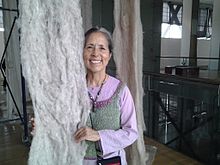Cecilia Vicuña
Cecilia Vicuña (born July 22, 1948 in Santiago de Chile ) is a Chilean poet , sculptor , painter , installation and performance artist .
life and work
Cecilia Vicuña graduated from the Universidad de Chile with a Master of Fine Arts in 1971 and studied at the Slade School of Fine Art in London from 1972 to 1973 . Due to the political situation before the coup in Chile in 1973 , she went into exile . First to London, then to Colombia and finally to New York.
In the mid-1960s, Vicuña began assembling materials such as feathers, stones, plastic, wood, cables, shells and fabric as poetic fragments to create fragile, short-lived structures. She began to be interested in quipu and in the early 1970s she weaved her own knot script from unspun wool . Vicuña's surreal figurative painting of the 1970s is more personal and political than her other works. They were a direct response to the unrest in Chile and their subsequent exile.
Language, memory, dissolution, extinction and exile are central themes in her work. Her artistic practice is linked to ecofeminism . She was a participant in documenta 14 in 2017 .
“Her site-specific projects are an expression of her gift for composing spatial poetry, sensitive, emotional poetry in three dimensions. Vicuña calls these special works "quipoems" - a fusion of "poem" (English for "poem") and " quipu ". "
Awards (selection)
- 1997: Andy Warhol Foundation Award
- 1999: Anonymous Was A Woman
Web links
- Website Cecilia Vicuña
- artishock A conversation with Cecilia Vicuña: Artists for democracy's Future Archive (English)
- memoria chilena Cecilia Vicuña (1948-) (Spanish)
- Bomb Magazine Cecilia Vicuña by Elianna Kan (English)
- Poetry Foundation Cecilia Vicuña
Individual evidence
- ↑ a b Lehmann Maupin Biography Cecilia Vicuña , accessed on July 26, 2019. (English)
- ↑ deutschlandfunk The story of the red thread , accessed on July 26, 2019
- ↑ Tate Cecilia Vicuña , accessed July 26, 2019. (English)
- ↑ documenta 14, daybook Cecilia Vicuña , accessed on July 26, 2019
| personal data | |
|---|---|
| SURNAME | Vicuña, Cecilia |
| ALTERNATIVE NAMES | Vicuña Ramírez, Cecilia |
| BRIEF DESCRIPTION | Chilean poet, sculptor, painter, installation and performance artist |
| DATE OF BIRTH | July 22, 1948 |
| PLACE OF BIRTH | Santiago de Chile |
